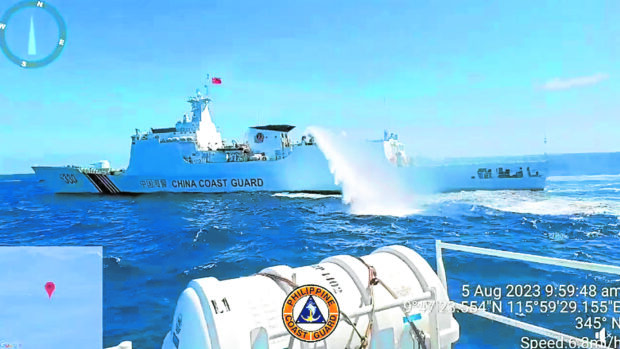
DANGEROUSMOVE This video grab from the Philippine Coast Guard (PCG) Facebook page shows the China Coast Guard’s dangerous maneuvers and illegal use of water cannons against the PCG vessels escorting supply boats chartered by the Armed Forces of the Philippines on Aug 5. The Philippine boats were delivering food, water, fuel and other supplies to soldiers stationed at BRP Sierra Madre in Ayungin Shoal.
China’s use of water cannons against smaller vessels during a recent resupply mission in the West Philippine Sea is a gray zone tactic—or coercive action below the use of military force—to enforce its maritime claims, according to a security expert.
Ray Powell, who leads Project Myoushu (South China Sea) at Stanford University, said the blasting of water cannons by the China Coast Guard (CCG)against Philippine vessels, such as what happened at Ayungin (Second Thomas) Shoal on Aug. 5, also shows China’s “strategy… to deny the [Philippines the] capability to repair or replace the deteriorating ship until it breaks up or becomes uninhabitable.”
He was referring to the BRP Sierra Madre, a World War II-era warship that the Philippines grounded in 1999 to stake its claim over the area of Ayungin Shoal, which is within the country’s exclusive economic zone (EEZ).
On Tuesday Beijing once again urged Manila to take out its grounded vessel.
“Once that happens Beijing calculates that the Philippines will have lost its only foothold and will have no choice but to surrender control of the shoal to China,” Powell said in an interview with the Inquirer on Tuesday.
China claims nearly the entire South China Sea, including the West Philippine Sea, the waters within the country’s EEZ.
‘Aggressive behavior’
According to Philippine Coast Guard (PCG) spokesperson Commodore Jay Tarriela, ships are equipped with water cannons primarily for responding to fire incidents at sea.
But the CCG uses it for “harassment,” he said.
“We interpret it as mere harassment. I think it is inappropriate to use it as a nonlethal weapon to prevent the PCG from carrying out its mission in providing safe passage to our supply boats,” he told the Inquirer.
The PCG is unlikely to fire back with water cannons should a similar encounter happen in the future, he said.
“We’re not going to react to whatever aggressive behavior that the Chinese has been doing against the PCG vessels and we abide by the rules-based order… For us, water cannons are only used for firefighting,” he said.
Tarriela said the boats used for the Navy’s supply runs—which are made of light materials—could be significantly damaged or could capsize if directly hit with water cannons.
Beijing deployed eight Chinese vessels—six CCG ships and two militia ships—to harass the two PCG ships and two smaller boats by the Navy. Only one of the two boats was able to bring provisions to BRP Sierra Madre.
But the boat which evaded a blockade was also chased by the Chinese, according to Armed Forces of the Philippines spokesperson Col. Medel Aguilar.
The CCG deployed two rubber dinghies and followed the supply boat inside the shoal, stopping some five yards (5.72 meters) away from the BRP Sierra Madre and staying there for 30 minutes, he said.
The AFP is still planning the next resupply mission to bring the undelivered provisions, he said.
“After this incident, we’ll have to see what is applicable. By that time, the world is watching. People around the world will be very much interested to know about the succeeding missions after what happened last Saturday,” Aguilar said.
House support
Meanwhile, Speaker Martin Romualdez on Tuesday said the House of Representatives would support an increased spending on defense in the proposed national budget for 2024.
“As a nation, we must take proactive measures to enhance our defense capabilities and ensure that we have the necessary resources to effectively protect our sovereign rights,” he said in a statement on Tuesday.
Next year’s proposed budget has an allocation of P282.7 billion for defense, which is higher than the P203.4 billion in the 2023 budget and represents 21.6 percent of the proposed P5.768-trillion budget for next year.
“This allocation demonstrates our dedication to maintaining a strong and credible defense posture, one that sends a clear message that we will not compromise when it comes to safeguarding our national interests,” Romualdez said.
Regarding the harassment of Philippine vessels at Ayungin Shoal, the Speaker said: “We support [the President’s] position that we should continue to assert our sovereignty there and that we should defend every inch of our territory.”
In a statement, ACT Teachers Rep. France Castro urged her colleagues to realign the proposed P500 million in intelligence funds for the Office of the Vice President (OVP) to the PCG, as she noted that the Coast Guard has been getting only P10 million in discretionary funds since 2009.
“If the OVP is so concerned with national security then it should have no objections and would in fact support the transfer of its P500 million to the PCG,” Castro said.

